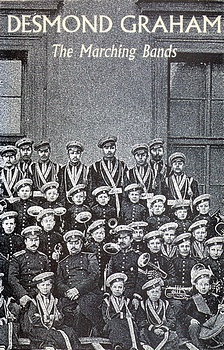The Marching Bands
Significant events of the twentieth century, be they public and tragic or private and joyful, have inspired Desmond Graham to write this moving collection. The book features a number of elegies to the great poets of both world wars, including Wilfred Owen, Edward Thomas, Ivor Gurney and Keith Douglas. These poems are evocative of the terrible atmosphere of wartime. Also here are speculative biographical pieces on painters and their families. An ‘Old Turner’ rows ‘toothless towards Battersea’, Monet surveys the famous water-lilies, and Rembrandt’s son Titus, reputedly ‘also a painter’ – but none of his work survives – captures on canvas his own short life. The final section of the books is a group of charming poems chronicling the birth and first five years of the life of the poet’s daughter, Milena.
‘It is difficult not to be entertained. Style is as colourful as subject matter as Graham plays with language and form, selecting the ripest of each.’ POETRY WALES
‘Desmond Graham’s poetry is permeated by allusions to our shared culture – music, song, dance, painting, film, all the arts of civilized European living…’ Jill Farringdon
The Mews
Green Label Chutney, Balkan Sobrani,
Petit Fours, Crepe de Chine, and grandma
chasing her angina floor to floor
through Harrods me on her arm, greedy
for the big time, Kensington and Christmas,
and that smell of class seeping through the gramophone
turned cupboard – mirrors, playing cards
and big wood dice for Trumps; she always cheated,
others told me; I listened for the games of Solo
to fall silent, turn into a row;
but she had pegged the cribbage board with death
for partner, tipping out his matchsticks
every year: his privilege, like mine,
to sit beside her, six foot
on the far side of everything there was.
Perhaps she was asleep the only time I saw her
bedroom, dark and small enough to be a coffin
where she lay, gaunt against white pillows,
the Sacred Heart above her, out of place;
in any case, she rose next day.
***
Acis and Galatea
(i.m. Keith Douglas, 1920-1944)
Where the Mediterranean turns in sleep
and sometimes pummels nightmares
on deaf rock and they frighten fish
into the harbour mouth banging the boat’s sides
and Polyphemus picked up his gat-toothed rocks
and lunged them after Odysseus,
here, where the tide turns so imperceptibly
you tell by the numbered boats which way
it flows, and behind you Etna sends its harmless
signals to nobody on earth, and the floor stays
flat, the roof rests, four walls stay vertical
and what you see is solid for a while –
Acis loved Galatea, for a little while,
between the lemon groves, the copses
where the nightingale first found its voice,
beside the sea where you walked, Keith,
on the far side, watching the sea bird rise and drop
into its shadow, before any of it happened,
before your Tunis, Tripoli, the many heads
of war watching you, till sea and sky altered
like a cloth, colour and sheen gone both.
Polyphemus struck down Acis
as you were struck, and whatever child
you might have had bled away for ever.
